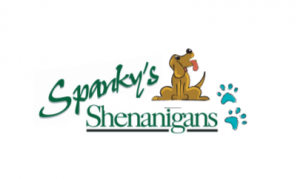
At the Humane Society of Loudoun County (HSLC), every animal we help is a life changed—sometimes even saved. But we can’t do it alone. That’s why we’re inviting you to take one simple step that can make a world of difference: become a Pet Partner through monthly giving.
More Care for Them—All Year Long
As a Pet Partner, your monthly gift provides lifesaving funds to dogs and cats in need—every single day, all year long. Whether it’s covering emergency vet care, food, or spay/neuter surgeries, your consistent support means we can always be ready to help.
- Small gifts add up. Even $10 a month can provide vaccinations for a pet entering foster care. Imagine what $25 or $50 can do!
- Reliable support. Monthly donations help HSLC plan ahead, knowing how many animals we can take in and care for, thanks to your dependable generosity.
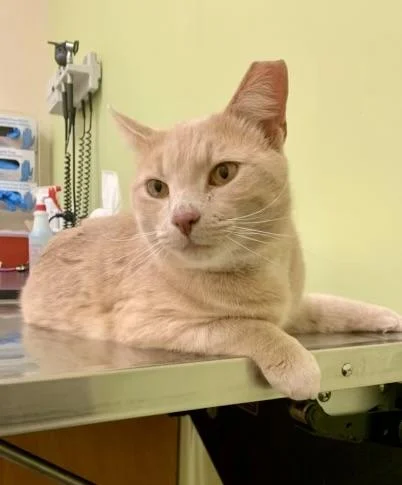
More Convenience for You
We’ve made giving easier than ever—so you can focus on the love you’re giving without the hassle.
- Your gift is automatically deducted each month.
- No checks to write, no stamps to find.
- Manageable contributions that fit your budget.
- Tax deductible and easy to track at the end of the year.
- You’ll be recognized as one of the animals’ most loving and reliable friends!
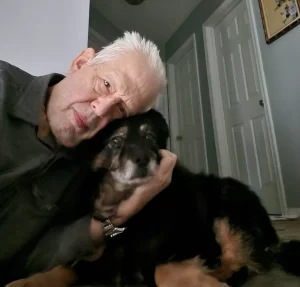
Get Started Today
Monthly giving is one of the most effective ways you can support HSLC. It’s convenient for you—and absolutely life-changing for the animals we serve. Your ongoing support ensures we never have to say no when an animal needs us.
Become a Pet Partner today. Once you click through, simply select your recurring donation amount and set the donation frequency to “monthly”. Your donation will be automatically charged to the credit card of your choice each month until you cancel, and you’ll be part of a compassionate community committed to helping more animals. Thank you for your kind and lifesaving support!

It’s hard to believe but 2025 is just around the corner. Are you thinking about adopting one or two new animal-friendly habits in the new year? If so, we’re here to help. Below are just a few resolutions to choose from:
1) Keep your pets healthy by giving them regular checkups—at least once a year and keep current with vaccinations.
2) Make dental care a priority through daily brushing and regular professional dental exams and cleanings. As many as 85% of American dogs and cats show signs of dental disease by the age of three.
3) If you haven’t already, spay and neuter your pets. Doing so helps cut down on the number of homeless animals and keeps your pets healthier.
4) Give your pets plenty of attention. Animals left at home alone become bored and lonely. They can become destructive. Provide regular play sessions, walks for dogs, and petting and/or other appropriate interaction for all animals.

5) Go easy on the treats. More than 50% of our nation’s pets are overweight or obese and face a variety of health conditions, including heart disease, diabetes, arthritis, high blood pressure, and cancer.
6) Prepare for disasters—fires, floods, storms, and the like. Have an evacuation plan that includes your animal companions, and prepare a traveling kit to have on hand always.
7) Be a voice for the voiceless and use social media to encourage friends, family and co-workers to save a life by adopting, not shopping.
8) Fostering also saves lives. HSLC provides regular trainings for those who are interested in fostering. Contact us at foster@humaneloudoun.org if you’re interested in fostering or complete a no-obligation application on our website.

By Kathleen Silver
(Updated 2024)
So far this year, the Humane Society of Loudoun County (HSLC) has adopted out nearly 150 dogs and cats and trapped over 115 community cats to have them fixed, vaccinated and chipped. This life-saving work is only made possible thanks to the support of caring individuals like you!
HSLC is an all-volunteer, non-profit organization committed to rescuing and caring for as many homeless and at-risk animals as possible. But, since each foster animal in our care costs an average of $1,000*, we are limited to the number of animals we can take in. Most of our donations are applied to veterinary costs to prepare an animal for their forever home.
Your Donations in Action
Did you know that with a donation of only $25, we can treat an animal for fleas and deworm her? A $50 gift will provide needed vaccinations or pet food kits for five struggling families.
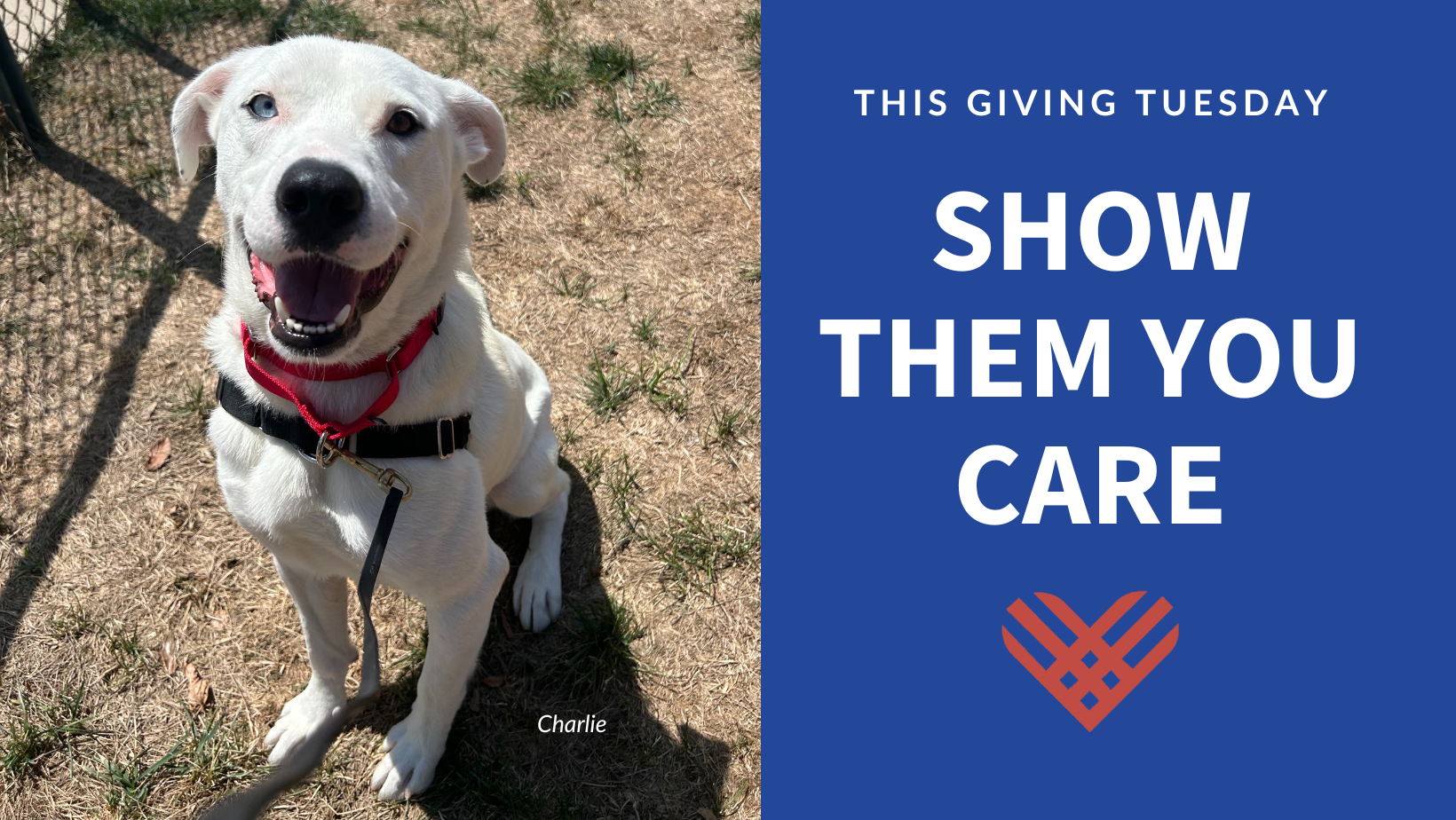
Perhaps you’ve been following a particular companion animal we are helping but cannot adopt yourself. HSLC also has a Guardian Angel program that allows you to sponsor that animal’s adoption fee ($150 for a cat and $300 for a dog), increasing their chances of being adopted. Adoption sponsorships help to defray the cost of care while an animal is in our foster network. And, if you don’t have your heart set on a particular animal, HSLC can easily choose a pet for you that needs the most help.
HSLC is a foster-based animal rescue that does not operate a shelter and therefore does not incur the expenses associated with running a facility.
Animals are Counting on You
With economic conditions being difficult this year, we know that money might be tighter than normal. But the calls to help our furry friends never stop. You can assist us in getting the push we need to help more animals in the new year.
There are many ways you can donate to HSLC. You can make a one-time donation or start a monthly donation online. Note that you can make your gift in honor or memory of a loved one. Or you can donate from your donor-advised fund — an increasingly popular way to express your support for the causes that mean most to you. Thank you for making a life-saving difference!
You may also like 4 Tax-Savvy Ways to Support HSLC Before Year-End.
*2022 figure; reflects discounts from our wonderful vet partners

Each year, nearly 10 million pets are lost in the United States. However, many are found when the owners take swift and necessary action. Summer can be a particularly scary time for pets who don’t respond well to fireworks and other loud noises or find themselves in strange places due to family travel. For these reasons, July is Lost Pet Prevention Month. I caught up with one of the Humane Society of Loudoun County’s most active volunteers, Jennifer Reed, who shared some useful tips she has picked up from her years of experience getting pets home safe and sound.
In preventing lost pets, owners should make sure to keep their pet safely quartered in the home when there are loud noises nearby such as fireworks, construction, or thunder. These disturbances can send pets into ‘flight mode’ and activate survival tactics that cause them to run for their lives. When this happens, the pet will likely be in a frenzy and not respond to people calling their name.
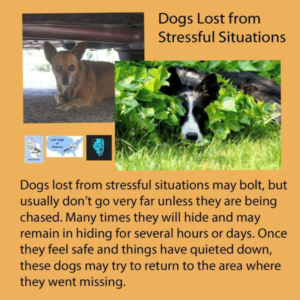 If you lose a beloved pet, Jennifer suggests placing 100+ flyers within a 2-4 mile radius of the missing area as quickly as possible. Flyers should include only the most important and clearest information, especially a line of direct contact (such as a cell phone number). The flyers should lead with “LOST DOG/CAT” in bold and large letters, a recent photo of the pet and employ a simple, uncluttered design. If space allows, add “Do not chase or call out” and “Please report sightings right away”.
If you lose a beloved pet, Jennifer suggests placing 100+ flyers within a 2-4 mile radius of the missing area as quickly as possible. Flyers should include only the most important and clearest information, especially a line of direct contact (such as a cell phone number). The flyers should lead with “LOST DOG/CAT” in bold and large letters, a recent photo of the pet and employ a simple, uncluttered design. If space allows, add “Do not chase or call out” and “Please report sightings right away”.
 Another tool to use are Community Facebook groups where you can relay information about your lost pet and allow members of the community to share it and directly comment with any useful information. Jennifer also recommends reaching out to local shelters and informing them of the missing animal. You can make a report with the Loudon County Animal Services at 703-777-0406 or reach out to local animal tracking groups such as Dogs Finding Dogs or Full Tilt Tracking once the first steps to relocate the pet are taken.
Another tool to use are Community Facebook groups where you can relay information about your lost pet and allow members of the community to share it and directly comment with any useful information. Jennifer also recommends reaching out to local shelters and informing them of the missing animal. You can make a report with the Loudon County Animal Services at 703-777-0406 or reach out to local animal tracking groups such as Dogs Finding Dogs or Full Tilt Tracking once the first steps to relocate the pet are taken.
As you wait for information to come in, create an action plan to implement once your pet is sighted. This plan should include establishing a feeding station and feeding routine to keep the pet in the area spotted so that trapping or catching the animal is possible. Be ready to monitor the feeding station with a surveillance camera like game cameras used by hunters. That way, you will know when and if the pet is still in the area and coming to eat.
Although all of these methods are effective and essential, the absolute best way to find a missing pet is to be ahead of the curve and get it microchipped when you adopt. Microchipping allows your veterinarian’s office to look up your pet’s unique ID number. Jennifer adds that you should also ensure that your personal information in the microchipping database remains up-to-date.
Lastly, if you find a missing pet, please bring it to a vet’s office to see if he/she is microchipped.

By Joan Cassell
With the recent snowfall here in Loudoun County, this is a good opportunity to take a mid-season look at your pet’s cold weather needs. If you think about it, your pets have the same basic requirements that you do: shelter, safety, water and food. So, whatever you do for yourself in winter, your pets will probably need something similar.
Outdoor Time
Like people, dogs are susceptible to frostbite and hypothermia and should be kept inside when the temperature is below freezing. Although many pets have thicker fur during the winter months, it is a common misbelief that dogs and cats are more resistant to cold weather than people because of their fur.
Short periods of outside time is great for exercise and will keep your dog* from getting bored. If you have a pet with a short coat, there is no shortage of really adorable sweaters and jackets available. When selecting pet clothing, be sure it is safe, comfortable and made of non-toxic materials. Your fur baby should be able to walk, see, and hear clearly.
*The Humane Society of Loudoun County does not encourage allowing domestic cats outside unless they are leash trained or in a contained area like an enclosed porch.
Food and Water
Cold weather and heated homes, especially those without a humidifier, can make pets extra thirsty. So, keep your pets hydrated by ensuring their water bowl(s) are always full and readily accessible year-round. If you have outdoor water bowls, check them daily to make sure the water hasn’t frozen.
Keeping warm uses more calories, so even short periods of outdoor play may require more food intake. If exercise does not increase significantly then you can maintain your pet’s regular food intake. If you have special concerns, as always, talk to your veterinarian.
Hazards
Ice and chemicals on the roads and sidewalks can damage paws. So, it is a good idea to moisturize your dog’s paws with petroleum jelly before heading out. And, be sure to clean those paws and legs after being outside. This will keep your pet from consuming harmful chemicals when they clean themselves. You may also want to consider pet booties to minimize contact with painful or poisonous substances like salt and ice melt crystals.
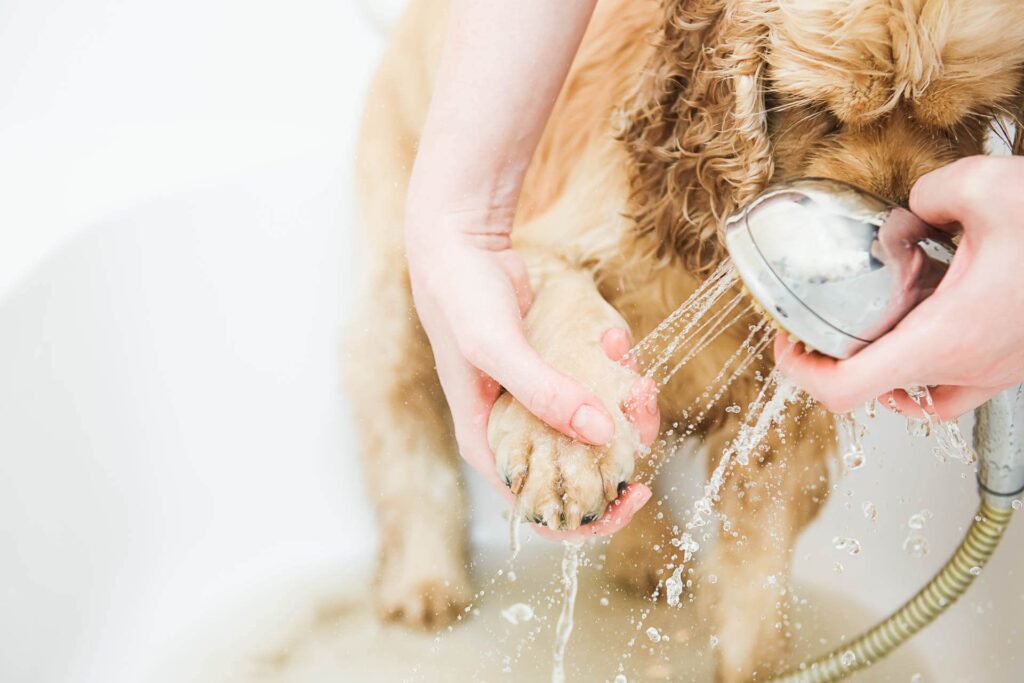
If your dogs are allowed to run off leash, always keep a very close eye on them to ensure they avoid frozen ponds, pools, lakes or other water sources. Unsupervised dogs may venture out onto a frozen area unaware of the dangers and get stuck in a bad situation. When in doubt, avoid these hazards altogether or keep your dog on a leash.
Lastly, notice your surroundings when you get ready to move your car. Sometimes stray and feral cats as well as other animals sleep in or under vehicles to stay warm. Before starting your car, honk the horn or bang on the hood to give any animals in or around your car a chance to escape.
Enjoy the outdoors with your pets for what is left of winter!
Looking for a cuddle buddy to snuggle with this winter? Consider fostering or adopting.

As a foster-based, all-volunteer organization, the Humane Society of Loudoun County relies on the community to provide homeless animals the second chances they deserve. Here are five “paw-some” ways to help our furry friends this holiday season.
1. Go Shopping
When you do your holiday shopping at Amazon Smile, please designate The Humane Society of Loudoun County as your charity. While on Amazon, be sure to check out our kitten registry and charity wish list. We also have a wish list on Chewy.com.
2. Support Giving Tuesday
This international day of giving on November 29 is the perfect time to “paws” and make a life-saving donation to HSLC. The more funding we have, the more animals we can help!
3. Become a Guardian Angel
Maybe you’ve fallen in love with one of our animals but can’t adopt. Or perhaps you see a cat or dog that has been on our website for a while but hasn’t been adopted. Sponsoring an animal’s adoption fee, in part or full, will increase the odds that they will find a loving “fur-ever” home in the near future.
4. Donate Your Vehicle or Property
Got a vehicle you want to unload before the new year? Consider donating it to HSLC. We offer free pick-up for donated vehicles of all types—cars, trucks, boats, and even ATVs. We also launched a real estate donation program this year to support our life-saving mission.

5. Give through a Donor Advised Fund (DAF)
More and more supporters are using DAFs to manage their charitable giving. They combine the most favorable tax benefits with the flexibility to support your favorite causes, like HSLC.
Thank you for helping animals in need this holiday season and throughout the year.
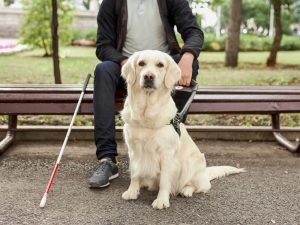
By Roman Freeman
You can see them all the time, if you’re looking – in the grocery store, at the mall, and in restaurants. We know that Service Animals get special privileges; but what are the rules? Who can have them? And when is an animal a Service Animal?
Americans with Disabilities Act
To understand the rules of Service Animals in the United States, we need to take a look at a set of federal laws known as the Americans with Disabilities Act (ADA). You may have heard of this before. For one thing, this is the legal precedent under which businesses are prevented from firing employees because of mental or physical disability. One of the many other things this set of laws covers is Service Animals.
It is important to note that the Americans with Disabilities Act is the one and only federal legal authority on what is and is not a Service Animal in the United States. Currently, there is no rule within the ADA that requires Service Animals to be registered or to have paperwork proving their Service status. This also means that there are no legal registries or certifications in this country on a federal level. Anyone can print off a card or a paper packet that says their animal has been “certified” as a Service Animal. But legally, this means essentially nothing.
Service Animal Defined
Then, how is it decided what is legally considered a Service Animal? The ADA states the following qualifications:
- A “Service Animal” is a dog that is individually trained to do work or perform tasks for a person with a disability.
You can see a list of some examples of work and tasks a Service Animal might perform (in addition to guiding the deaf or blind, or alerting to episodes of health conditions such as diabetes or seizures) here. You may also view a legal definition of disability and some conditions that may be recognized as a disability here.
- The work or tasks the dog is trained to provide must be directly related to the person’s disability. Dogs who function solely as comfort or emotional support do not qualify as Service Animals under the ADA.
Emotional Support Animals are, however, considered Assistance Animals and therefore legally receive housing rights. While Service Animals receive both the rights to live in any facility their handler occupies as a residence regardless of rules about pets on premises, and the rights to accompany their handler anywhere the general public is allowed to go; Emotional Support Animals (ESA’s) do not legally receive public access rights to be present in places like grocery stores or offices which do not otherwise allow pets on premises. When it does not directly conflict with a person’s housing rights regarding the Animal, an individual site can decide whether an ESA is allowed on premises.
- A Service Animal must be under control of its handler at all times. Service Animals must be harnessed, leashed, or tethered, unless this interferes with the person’s disability or the associated work the dog does. If they are not in some form tethered to their handler, the handler must keep control of the dog at all times with voice, signal, or other effective controls.
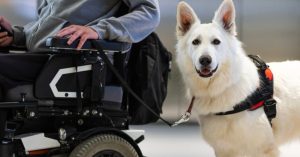
Summary
In short, a Service Animal is legally any dog trained to actively perform work or tasks to mitigate a disability, without presenting a danger to the public in any way and kept under control by its handler at all times. There are no rules at a federal level about breeds, certifications, registries, or training methods. You can view more about these laws and others at the ADA website.
